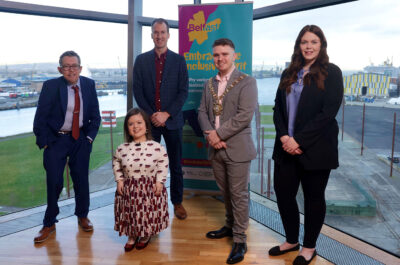In Europe as a whole the study found that over 3 million tourism businesses are not prepared to cater adequately to the accessibility market. By 2020, an additional 1.2 million enterprises need to provide accessible services in order to accommodate the lowest forecasted demand.
A new study on the supply of accessible tourism services in the EU Member States, financed by the European Parliament, shows that there is a general lack of provisions for visitors with access needs.
Greater commitment and cooperation is needed between tourism authorities, destinations and enterprises, if supply is to meet the growing demand for accessibility, especially from increasing numbers of senior travellers, many of whom face access difficulties.
In Europe as a whole the study found that over 3 million tourism businesses are not prepared to cater adequately to the accessibility market. By 2020, an additional 1.2 million enterprises need to provide accessible services in order to accommodate the lowest forecasted demand. Thus, there is a strong rationale for targeted actions by policymakers to improve support structures and incentives that will foster the growth if accessible services and to market these services to travellers within Europe and those from other source markets.
The study gathered data from a wide range of sources, showing that an estimated 9% of Europe’s tourism services already have some level of provision for travellers with specific access needs. However, the distribution of accessible services is highly uneven across Europe.
On the positive side, the report shows that a number of leading destinations and “mainstream” suppliers are integrating accessibility measures into their products and services, enabling them to serve a wider market, thus making their business more sustainable over the long term.
The “front-runner” countries, with the greatest numbers of accessible services, are France, Italy, Spain and the UK. These and other countries have invested not only in adapting and building accessible infrastructure but also in developing staff training schemes focusing on disability awareness and accessibility as part of customer service training. This, in turn, helps to give customers the confidence to travel with greater security, knowing that their needs will be met.
Lack of services for visitors with disabilities
The study has confirmed the general impression that where accessible services are offered, the vast majority of these address the needs of people with reduced mobility due to motor difficulties or impairments.
Visitors who have other access requirements, such as those who need services for people with low vision or reduced hearing or special diets, are under-served in the market.
Visitors with intellectual disabilities or learning difficulties are the least served of all customer groups.
Lack of services for these groups means that their travel choices are limited – but it also implies “lost” income to tourism providers.
Business barriers
The study has identified important gaps in awareness and knowledge about accessible tourism among suppliers.
The European Commission’s tourism policy officer, Antonella Correra, states: “One important result of this study is that the first barrier is not the lack of financing. There is a perception that accessibility is expensive but when businesses were asked, it was mainly the lack of available guidance that holds them back. Knowing what needs to be done to make their services more accessible is the primary issue.”

Ivor Ambrose, Managing Director of the European Network for Accessible Tourism, which carried out the study together with VVA European consultants and EWORX S.A., adds: ”The study shows that businesses are largely unaware or cautious of the market potential and the business case for investing in the accessible tourism market.”
Referring to some of the good practices that the study has identified, Ambrose continues: “We have developed fifteen Case Studies, from Rovaniemi, the home of Santa Claus in Finland, to Paris Region – the world’s number one city for tourism. The studies highlight destinations that are working to create accessible itineraries and experiences for seniors, people with disabilities and families with small children, enabling these customers to enjoy a visit on equal terms with everyone else. Experiences from these destinations have been used to draw up recommendations and explain the tools and methods that other aspiring accessible tourism destinations and suppliers can adopt. We hope these will be a source of ideas and inspiration to many destinations and businesses”.
The study points to evidence that improvements to accessibility, whether they are in infrastructure or in many kinds of service, can increase sales, encourage repeat visits and bring higher average spend. However, proving the business case for accessible tourism is still a challenge in many areas. More regular and systematic market data is required in EU countries to guide business investors and public sector actors.
Another recent EU study of tourism demand has estimated that the accessible tourism market in Europe is made up of over 138 million people, of which only about half are regular travellers. The gross value added contribution of those who did travel in 2012 was estimated at 150 Billion Euro and the direct contribution to employment was about 4.2 million persons.
Accessibility – boosting tourism business, improving local communities
The Supply Study concludes that ‘mainstreaming’ accessible tourism policies in destinations can enhance the quality of tourism products for all visitors, as well as providing a pathway to local development. “It has been shown that, with stronger cooperation between decision-makers, destination managers, suppliers and the third sector, the focus on accessibility can lead to new jobs and business opportunities for entrepreneurs and investors” says Ambrose, concluding: “This recipe can give a boost to the tourism industry and also improve conditions generally for local communities”.
Recommendations from the study are being adopted in the current EU tourism development programmes, in particular through support for Small and Medium-sized Enterprises to improve their staff skills for serving customers with various access needs and to develop accessible itineraries and supply networks.
Tatiana is the news coordinator for TravelDailyNews Media Network (traveldailynews.gr, traveldailynews.com and traveldailynews.asia). Her role includes monitoring the hundreds of news sources of TravelDailyNews Media Network and skimming the most important according to our strategy.
She holds a Bachelor's degree in Communication & Mass Media from Panteion University of Political & Social Studies of Athens and she has been editor and editor-in-chief in various economic magazines and newspapers.





























































































































































































